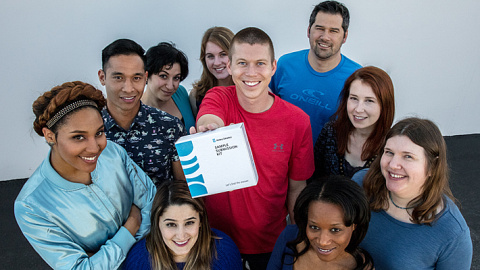- By Catherine Schultz, MS, CGC
- Posted March 23, 2023
Ambry Genetics Diagnostic Dilemma: +RNAinsight® Reveals Lynch Syndrome in Sisters
In recognition of Colon Cancer Awareness Month, Ambry would like to share the story of Jane and Julie Smith (not their real names) – sisters and cancer survivors. Jane was diagnosed with colon cancer in 2004 at the age of 36. While she was concerned about her diagnosis and family history of ovarian cancer, genetic testing was not widely available…
- By Jaime Burguieres
- Posted September 29, 2022
An Attitude of Gratitude: Jaime Burguieres’ Previvor Cancer Journey Guided by Ambry Genetic Testing
When Jaime Burguieres was young, her 43-year-old maternal aunt was diagnosed with breast cancer. Burguieres watched her vivacious aunt go through painful radiation and chemotherapy treatments that seemingly eradicated her cancer at the time. A few years later, her aunt was diagnosed with Non-Hodgkin’s Lymphoma in the breast, stomach, and hip,…
- By Eleanor Meghan Cary Brown
- Posted March 8, 2018
No Colon, No Cancer: I Fought for the Life I Deserved.
I never thought I’d hear the “C” word. Newly married and about to start my graduate degree, everything seemed bright. That is until a routine colonoscopy discovered severe high-grade dysplasia. My doctor explained that he was confident it would eventually manifest into cancer and urged something be done. With the click of the phone, I collapsed…
- By David Dubin
- Posted March 30, 2017
Since You Asked, Here's My Advice to Cancer Patients
In my role as co-founder of AliveAndKickn, people ask me for my opinion all the time. Topics range from how to manage pain, how to navigate post-cancer survivorship, to whether or not the U.S. will ever become a world soccer powerhouse. (No, I’m not kidding.) I’m not big on giving advice, but I try to answer as honestly as I can. First,…
- By Kory Jasperson, MS,CGC
- Posted March 23, 2017
How Expert Care Teams Can Help You - Repost
Editor’s Note: In recognition of National Colorectal Cancer Awareness Month, we are re-posting this piece by an Ambry genetic counselor. His many years of clinical experience working with families affected by hereditary colorectal cancer helped him understand the importance of expert care teams, and how they can help you. My name is…
- By Jackie Connor
- Posted March 14, 2017
Four Reasons Why Genetic Testing Matters to the Individual with Colorectal Cancer
Colon cancer is the third most common cancer diagnosed in both men and women in the United States, and more than 95,000 new cases of colon cancer and 39,000 new cases of rectal cancer are estimated for 2017, according to the American Cancer Society. Up to 10% of colorectal cancer is hereditary, or caused by inherited gene mutations. Hereditary…
- By Selvi Palaniappan, MS, CGC
- Posted March 9, 2017
Individual Genetic Test Results Lead to Individual Considerations
As a genetic counselor specializing in cancer genetics, I’m happy to be contributing to the Ambry patient blog during National Colorectal Cancer Awareness Month. Colorectal cancer can happen by chance, but it can also be inherited. Your doctor or genetic counselor can evaluate your family history to determine if you should consider genetic testing…
- By Georgia Hurst
- Posted March 2, 2017
March is Colorectal Cancer Awareness Month- Do you Know About Lynch Syndrome?
In honor of Colorectal Cancer Awareness Month, I would like to discuss the most common cause of hereditary colorectal and uterine cancer – Lynch syndrome. In fact, this post is dedicated to my brother Jimmy, who died of colon cancer due to Lynch syndrome at the age of 36. Lynch syndrome is a hereditary cancer condition passed down in families…
- By Dr. Dennis J Ahnen
- Posted December 8, 2016
Here’s To Our Families
I am, appropriately, finishing this post on Family Health History Day (the fourth Thursday in November, formerly known as Thanksgiving in the U.S.). The holidays are traditionally a time to get together with family, and what better time to focus on the importance of the health history? In this spirit, I thought we could focus on how a discussion…
- By David Dubin
- Posted November 3, 2016
Just Call Me “Above Average Dave”
“Superhero.” Has a nice ring to it, doesn’t it? Flattering, obviously. As someone who has survived multiple cancers, still plays and coaches soccer, had his colonoscopy footage used on national television, and does a lot of public work, I’ve been given a few titles. One of them is superhero. Thanks. But I worry that people, especially others…









